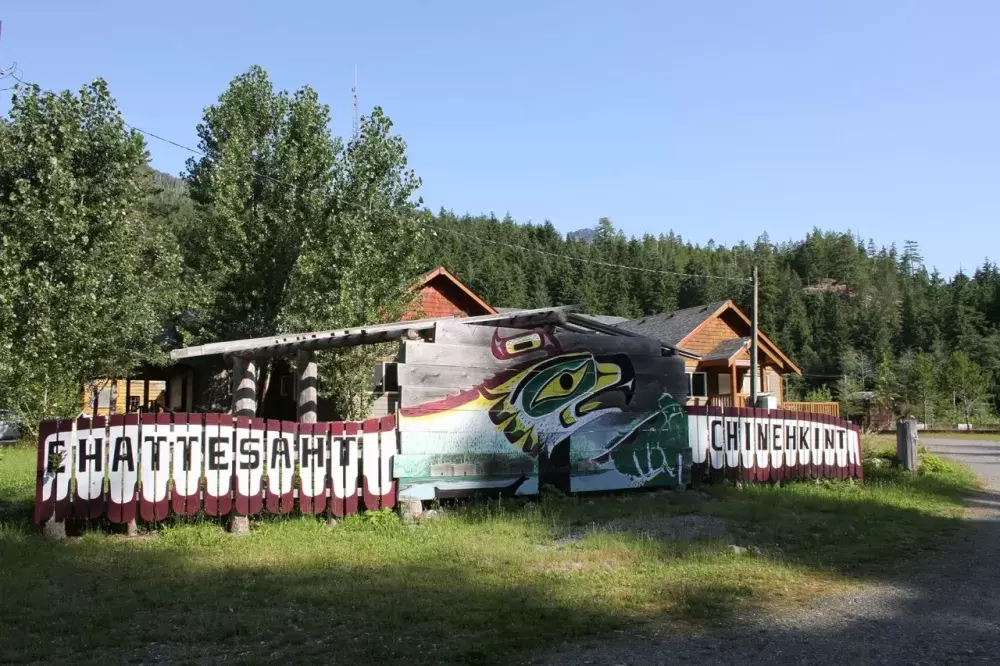COVID-19 spread through the Ehattesaht Chinehkint First Nation reserve this week, resulting in nine active cases as of Nov. 26.
With the small community of Ehatis under a lockdown order, Councillor Ernie Smith gave an online update to members on Thursday afternoon through the First Nation’s Facebook page. He said 11 cases in total had been detected, although two had recovered.
“We are on day seven of COVID reaching into our community of Ehatis,” said Smith. “Please everybody, stay home, we don’t want to spread this virus any further than it already has.”
Daily life was made even more difficult today when a storm caused a power outage to the reserve next to Zeballos, said Ehattesaht Chief Elect Simon John.
“It’s stormy here and the COVID storm continues,” he said, noting that most Ehatis residents don’t have generators to provide backup power. “Hopefully we’re at the back end of it now after a couple of days.”
The closest hospital is 200 kilometres away in Campbell River, with part of this trip by logging road. Fortunately, no COVID-19 hospitalizations have been reported from the First Nation.
“Everybody is just isolating at home. Some of them are getting transported to Campbell River to hotels,” said John. “If they are in a house with COVID, they cannot stay in the house.”
“Anyone requiring hospitalization related to COVID-19 symptoms will be transferred to an appropriate acute care facility and there are plans in place to accommodate those transfers, if and when they are needed,” stated Island Health in an email to Ha-Shilth-Sa.
Supplies of personal protective equipment have been provided by Island Health and the Nuu-chah-nulth Tribal Council’s nursing department, while a nurse has come to the community almost daily to perform testing, explained John. A rapid testing machine in Port McNeill is being used to identify cases, said Island Health
“Any symptomatic close contacts will be tested to identify new cases as quickly as possible,” wrote the health authority. “Island Health’s GeneXpert machine located in Port McNeill is supporting rapid testing for these remote communities.
Residents of the area were alerted on Nov. 20 that a positive COVID-19 case had spent time at the Zeballos Elementary Secondary School earlier in the week, and this person also visited Ehatis as well as the nearby Nuchatlaht community of Oclujce. Contact tracing from the BC Centre for Disease Control began Nov. 21, while Ehattesaht members were told to self isolate and only socialize with those in their home.
John said it has not been determined if the school’s visitor is responsible for the cluster of cases, noting the limitations of contact tracing into the origin of the community’s coronavirus cluster.
“We’re beyond that by a week now, you can’t go that far back to generate the result of where it started,” he said. “We don’t know where it started, that’s what we’re not aware of because tracing doesn’t go backwards, it goes forwards.”
The spread of cases in the remote community is a scenario that many Nuu-chah-nulth leaders have feared for months. In September the NTC, Heiltsuk Nation and Tsilhqot’in National Government filed a complaint to the B.C. Information and Privacy Commission, pushing for First Nations to be supplied with more detailed information on positive cases near their communities. The coalition is asking for the specific location of a confirmed infection, whether the case is someone who has travelled to a First Nation community in the preceding two weeks and the identity of the person if they are a member of one of the collective’s nations. The name of the case is necessary for effective, culturally sensitive contact tracing, argues the coalition.
“As one of our communities is in the midst of an outbreak, this information becomes even more critical to Nuu-chah-nulth,” stated Judith Sayers, president of the Nuu-chah-nulth Tribal Council, in a press release. “We call on Premier Horgan to ensure his new ministers' mandate letters include a strong commitment to sharing information and saving Indigenous lives.”
The province has yet to bend to this call, citing the importance of protecting the privacy of positive cases. During a press conference on Sept. 15, Health Minister Adrian Dix commented that risking the disclosure of a person’s identity could discourage more people from reporting themselves as the province works to control the pandemic.
“There are issues to balance here in terms of people’s right to privacy, which is closely connected to their willingness to engage in the process of the health care system. This has been a discussion from the very beginning with the first cases,” said Dix. “We have seen examples in communities - it can be a challenge in small communities and big communities - who are being blamed for having COVID-19, and we want people to come forward. We want people to let us know who their contacts are.”
Meanwhile, residents of Ehatis are carrying on with their lives to the best of their ability under a lockdown with no electricity. With a cellphone resting of his car’s dashboard, Frisco Lucas videotaped a message to help Ehattesaht members.
“I’m going to do a quick chant for you guys, I understand there’s more numbers coming out,” he said in a post on the First Nation’s Facebook page.







